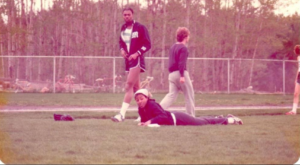by Sarah Tate Chambers
I’ve heard about you. We haven’t met yet, but I’ve caught bits of your stories from those we share in common: from the sports masseuse, the pulmonary PA, and the physiologist. I’ve heard that some of you are the only one still struggling on your team, some of you are teenagers, some of you are on room oxygen, some of you still stare at CTs filled with scarring.
There’s a bit of shock to all of it, isn’t there. We were among the healthy, the group that the nightly news often proclaimed as free from the death grip that the pandemic held on the world. So, some of us escaped the only way we knew how. Others did all the errand-running for at-risk folks. Some, out of necessity, kept showing up to work. Others kept an isolated existence and by a terrible stroke of chance still contracted COVID-19.
And, when the shock wears off, we are left with the damage. For those of us sportswomen who didn’t clear COVID-19 with ease, we are left in a healthcare maze with many unknowns. It’s hard enough to figure out what’s going on with our bodies let alone to find a mindset that will propel us through recovery—on the heels of a pandemic. Here are thoughts that I wish someone would have talked me through in the beginning of my diagnosis. Take them with a grain, or two, of salt, and, if beneficial, tweak them to fit you.
Fight for the Best Healthcare Possible
This is always a battle for us, isn’t it. Please take all the liberties in using your command voice. Let your best friends play your right tackle. Whatever lengths necessary to get the care you need, go to them. If one doctor throws up her hands, find another one. COVID-19 is as new to the medical community as it is to you and me. In the best of circumstances, it will be challenging to find good care. In the circumstances you’re in, please be persistent until you’re confident in the diagnosis, prognosis, and treatment plan. And when you find the medical professionals that instill such confidence, feel comfortable to show your gratitude. For me, the right ones shined some of the brightest light on the path forward.
Create Your Own Care Plan
You are the expert on your own body—with every illness but especially in such a varied and unfamiliar one as COVID-19. Most of us will not have the healthcare structure to develop a comprehensive plan, so we will need to do it ourselves. Harness all of your creativity and develop the best plan to get you moving forward: breathwork, PT exercises, nutrition, training, mental strength, agility, and so on and so on. You can use everything you learned from your medical professionals and put it to work here. Don’t be afraid to take it too far. Toss everything at the wall and take note of how your body responds. Feel free to adjust, and experiment with, the plan throughout your recovery process.
Accept that Your Capacity is Different Than Those Around You
“What’s the worst that could happen if I did the run with them,” I asked. “You’d pass out,” the trainer answered. “Sure, maybe, but I wouldn’t die,” I replied. Evidently, the importance of acceptance did not come naturally to me. Not wanting to miss out on the team building, or the potential fitness gains, I kept pushing back on alternative workouts. Finally, it got through to me: at this moment, I have less lung capacity than everyone else. When I was at the bottom of the pack, it was entirely logical: my lungs could convert less oxygen than theirs. My failure to lead any workout wasn’t a failure of perseverance, grit, or fortitude; it was the stark reality of my lungs as they functioned in that moment. That flipped a switch in my mind, and I was able, ever so slightly, to let go of my group performance.
Accepting an ailment is not easy but accepting that it is a reality is a step in the right direction. It is a stone that I can chip away at; one day, one hammer strike may bring it all to the ground. The more I’m able to accept reality, the more I can calibrate my internal drive and dismiss certain external pressures.
Reach Out to Others who Will Walk with You
The cultural climate around the pandemic may lend itself to others having strong opinions about your health: how you contracted the virus, if protecting you was worth the restrictions, and so on. Try not to take it personally. There may also be folks who position themselves as authorities on the matter: they too will try to tell you where you may, or may not, have picked up the virus and whether your symptoms are “acceptable” or not. Please also try to let these opinions roll on by. Reassure yourself that they are not on your medical team, and keep moving.
There may also be those on your coaching staff or team who send wildly ridiculous comments or suggestions your way. There are many ways that you could handle it, including assuming the best, giving them grace for their ignorance, and continuing to plug away at your own workouts. However you deal wit it, please don’t internalize it or place yourself in danger to appease them. You’re worth way more than that.
And while you’re doing the work, do reach out to those you care about who will walk through this with you. Sometimes, I text a friend who is excellent at one-line jokes, or I call up one who will listen and support. I hit the gym with the one who encourages every minor victory and would never shame my performance. If the pandemic has shrunk your support network, like it has for many, it may be worthwhile to rekindle those relationships or find new ones in online communities. Knowing what we need in a friend now will help us know what to give to injured friends in the future.
Forget Your Old Metrics, Compete with Last Month
Somedays, I keep checking my Garmin records as if the past would have changed and they’d all be dated 2021 instead of 2020. If I compared every workout to those workouts, I’d score every one as a loss. Those losses, piled on one another, would feel insurmountable. Instead, I’ve started comparing my metrics to last month’s. For me, a month accounts for enough fluctuation to see tangible improvement. Dropping your expectations, which feel like your standards, is challenging. But, doing so allows you to grieve the loss and, at the same time, take steps forward in your new reality.
Keep Rowing the Boat
Once you’re cleared to get back into workouts, get after them with determination and strength. Don’t dismiss the playing ground as no longer your space. That field, that track, that court, that studio, that whatever is just as much yours as it was before you caught coronavirus. You still belong here. Make friends with it again. There is still strength in you. It may not be as overwhelming as it was before, but it is still present. Chase after it with your previous perseverance.
It’s been helpful for me to view my workouts as rowing the boat. Forever a Gopher, Coach PJ Fleck’s “Row the Boat” mantra propelled my family and me through some of our toughest times. Among other things, rowing the boat means never giving up, putting your oar in the water—continuing the work with all the energy that you can muster—despite not being able to clearly see the future or the progress.
During rebuilding, each of my workouts may, by the metrics, be lackluster. Overall, progressive but certainly not splashy. The motivation for today’s workout isn’t always springing from yesterday’s success but from a commitment to do the work necessary with the trust that it will, eventually, produce fruit.
Know that You Are Not Alone
When you’re the only one still struggling to breathe as you run up the hill, when the one teammate you commiserate with starts to pass you: hold fast. You may be the only one on your team but you are not the only one struggling through this. There are others scattered around who are waking up every morning and fighting this same fight that you are—attempting to return to their prior physical condition with all the strength they can muster. They too are fighting back tears in the middle of workouts that go terribly wrong. I am. The next time you find yourself feeling isolated, remember all of us, remember me, and know that you are not alone in this struggle. Tomorrow’s workout may be vastly better. If not tomorrow’s, next week’s or next month’s.
Celebrate Every Little Victory
When the victories come, celebrate each one. Whether it’s tickets to a now-in-person game, flowers from the farmers’ market, a drive with all the windows down, a special meal, or a slow walk in your favorite spot, take the time to celebrate the wins. I’m prone to take a second to smile and then plow through the victory—there’s always another mountain on the horizon. But in this recovery, there are a lot of challenges even when the victories start to peak through. I’ve realized that I can sustain myself through more challenges when I’ve paused to rejoice in each win. Every little good thing is now a step toward the capability and capacity we once had.
Until Then . . .
When our breath becomes easy and we are back to performing at full-steam, I’ll be thinking of you. We will share an experience colored with pain and disappointment, but then, I think we’d grin knowingly at one another. Proud of what we found in ourselves, proud of how we kept showing up, proud at where all of that rowing got us. Until then, I’ll keep pressing forward with the hint of our recovery on the horizon.



